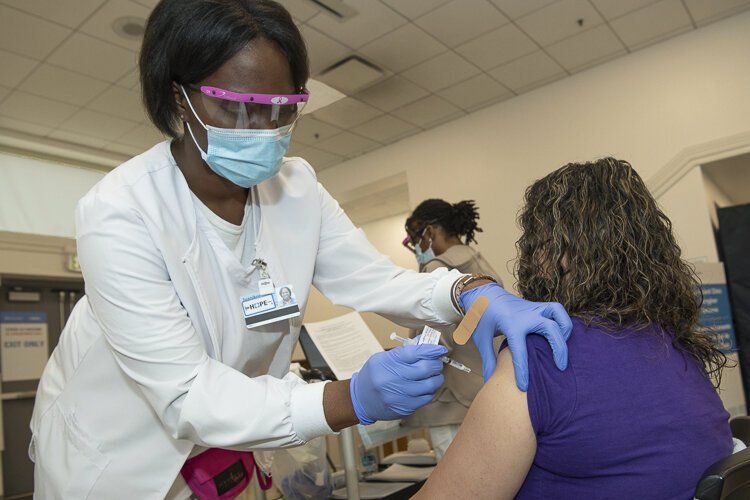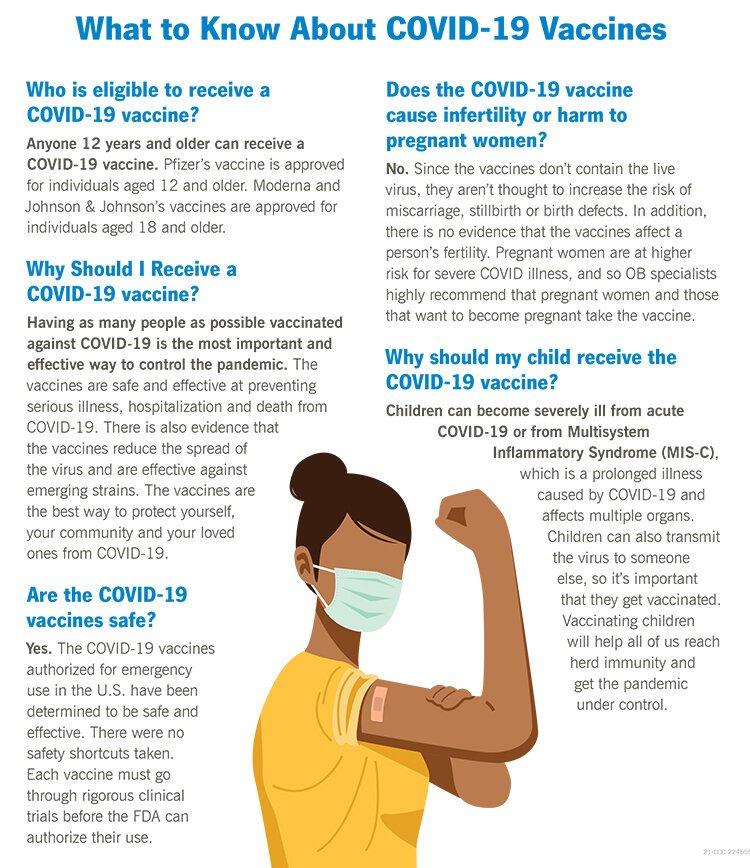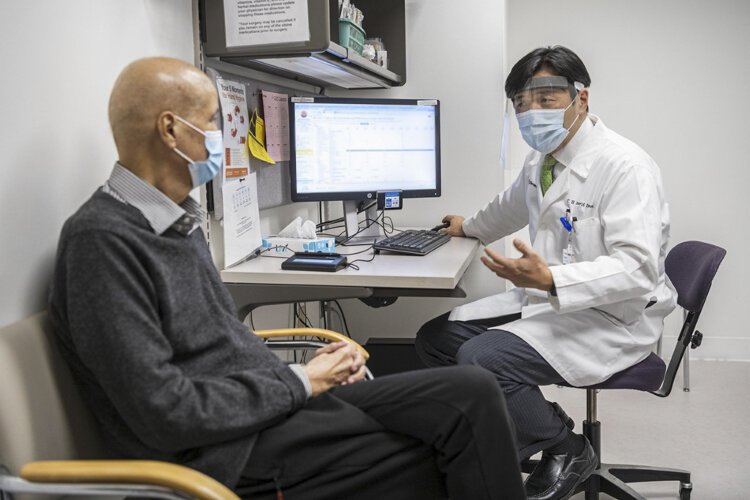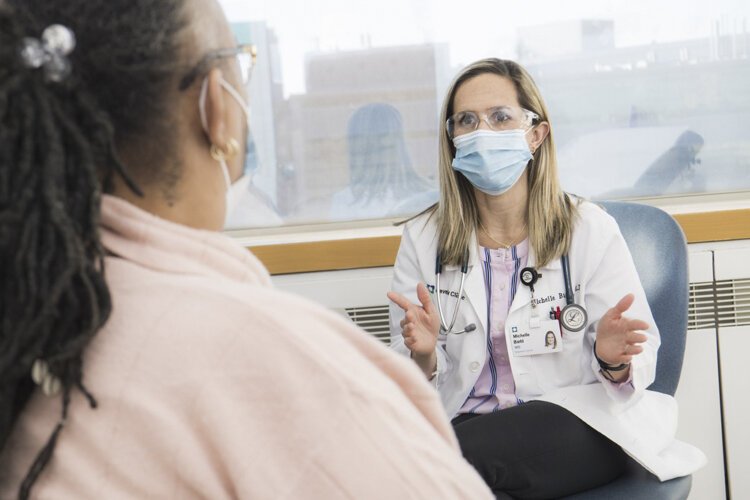One-on-One: Cleveland Clinic providers speak to patients about the Delta variant and the vaccine
The COVID-19 Delta variant has quickly become the primary strain of the virus in the United States. According to the Centers for Disease Control and Prevention (CDC), the Delta variant now accounts for more than 82% of all current COVID-19 cases. The variant, also known as B.1.617.2, originated in India and was first detected in the U.S. in March 2021.
It is now estimated to be more than two times more transmissible than previous variants.
While cases of COVID-19 have fallen significantly in the U.S. since the beginning of the year, the Delta variant is now triggering a new rise in cases, hospitalizations. and deaths.
 There is definitely more benefit to getting vaccinated and more risk to not getting vaccinated.“There are two things that make the Delta variant unique,” says Dr. Daniel Rhoads, pathologist and section head of microbiology for Cleveland Clinic. “It is much more transmissible than other COVID-19 variants which means it can spread more easily and more quickly. We also now know that it is able to cause disease or infection in immunized individuals more often than the Alpha variant.”
There is definitely more benefit to getting vaccinated and more risk to not getting vaccinated.“There are two things that make the Delta variant unique,” says Dr. Daniel Rhoads, pathologist and section head of microbiology for Cleveland Clinic. “It is much more transmissible than other COVID-19 variants which means it can spread more easily and more quickly. We also now know that it is able to cause disease or infection in immunized individuals more often than the Alpha variant.”
Early reports suggest that Delta is also causing different symptoms than previous COVID-19 strains. Cold-like symptoms, including headache, runny nose, and a sore throat, are now being reported while COVID-19 symptoms in previous variants, such as loss of smell, shortness of breath, fever and persistent cough, are less common.
Delta is also resulting in more severe disease and is infecting younger age groups at a higher rate. While younger people are less likely than older adults to get severe disease from a coronavirus infection, they are also less likely to be vaccinated.
The COVID-19 vaccines are proving to be very effective against the disease including the Delta variant. “About a year ago, people were hoping that the COVID-19 vaccine would be about 50% effective in preventing COVID, similar to what the flu vaccine typically is in preventing flu,” says Dr. Rhoads. “However, the Pfizer and Moderna mRNA vaccines have proven to be 88% to 90% effective, which is much higher than expected. While the Delta variant is still able to cause disease in some vaccinated individuals, the vaccines are doing a great job at keeping these individuals out of the hospital.”

Among vaccinated individuals, there is a much lower chance of being infected and of developing severe disease that requires hospitalization. “If you are vaccinated, the chances of being hospitalized with COVID-19 are low,” says Dr. Melissa Li-Ng, endocrinologist and medical director of International Operations at Cleveland Clinic. “There is still a small chance of being infected and being able to spread it to others, but you are not going to get as sick.”
Individuals who are not yet vaccinated are most at risk. “For unvaccinated individuals, the risk is much higher in terms of getting a severe infection and being hospitalized given how contagious this variant is, and the rising numbers of cases in states with vaccination rates less than 50%,” explains Dr. Li-Ng. “Clearly we are now seeing that almost all individuals across the country who are hospitalized with COVID-19 are not vaccinated.”
Approximately 50% of the U.S. population has been vaccinated—with a lower vaccination percentage in many states and vaccination rates falling significantly in recent months.
“What I am concerned about most as a physician are the immune naïve,” explains Dr. Rhoads. “These are individuals whose bodies have never seen the virus or the vaccine and are still at risk of getting full-blown COVID-19. We know from past experience that these individuals, especially if they are older or have other co-morbidities, will likely have poor outcomes—including death.”
According to Dr. Li-Ng the Delta variant should be an incentive for people to get vaccinated, especially young adults. “Certainly, the rise in the Delta variant and the divide we are seeing between the vaccinated and unvaccinated has increased our urgency to vaccinate as quickly as possible.”
Cleveland Clinic has been at the forefront of the COVID-19 pandemic—providing ongoing information and vaccine access to the communities it serves. Through a collaboration with community leaders and local health departments, ongoing webinars, information sessions, provider talks, and community vaccination sites, Cleveland Clinic has continued to promote the importance of vaccination while providing vaccine access to vulnerable populations.
While information is helpful in encouraging people to get the vaccine, Dr. Li-Ng says now there has to be more discussion between patients and caregivers.
"I think we have reached the point that people have had enough vaccine information,” he says . “Now it really comes down to the individual one-on-one conversation between the patient and the provider in terms of what matters to that individual.”
 Those still unvaccinated are now encouraged to have a one-on-one conversations with their providers. “Feedback from our staff and community leaders tells us that patients trust information from their provider,” Dr. Li-Ng says. "Getting vaccinated is an individual decision and everyone has different priorities and concerns. Whether it is a past medical history, an immune compromised state, or concern over vaccine side effects, a one-on-one conversation with a trusted provider can help an individual make an informed choice and, in some instances, get the vaccine at the same location.”
Those still unvaccinated are now encouraged to have a one-on-one conversations with their providers. “Feedback from our staff and community leaders tells us that patients trust information from their provider,” Dr. Li-Ng says. "Getting vaccinated is an individual decision and everyone has different priorities and concerns. Whether it is a past medical history, an immune compromised state, or concern over vaccine side effects, a one-on-one conversation with a trusted provider can help an individual make an informed choice and, in some instances, get the vaccine at the same location.”
To address this need, COVID-19 vaccines are now available at almost all Cleveland Clinic primary care locations. Additionally, the Langston Hughes Health & Education Center, 2390 E. 79th St. in the Fairfax neighborhood still offers walk-in vaccinations at specified times, and vaccinations can also be scheduled at Fairview and Hillcrest Hospitals, and at the Cleveland Clinic Business Operations Center, 6801 Brecksville Road in Independence.
Vaccination offers the best protection against all known variants of COVID-19 including the Delta variant. But no vaccine is 100% effective and, with a highly transmissible virus like Delta, a little extra caution is advised.
“If you're going to be in a situation where you will be in contact with people who are unvaccinated or who might be carrying the virus, it's always best to have another layer of protection, like a mask or social distancing,” advises Dr. Li-Ng. “The more you're exposed to people who are unvaccinated, the greater the possibility of getting infected.”
It is very common for viruses, especially coronaviruses and influenza viruses that contain RNA as their genetic material, to continue to mutate. “These new waves of infections show us that the pandemic is not close to being over yet,” says Dr. Rhoads “As long as there is a lot of COVID-19 around, there are many opportunities for it to mutate in a positive direction and cause more disease.”
It is hard to measure exactly how much of an impact new variants initially have on the pandemic, since many factors contribute to how quickly a virus spreads—including human behaviors.
“There are a lot of variables changing at the same time,” says Dr. Rhoads. “The seasons are changing, mitigation practices are changing, and immunity is changing. Right now, the immunity looks good but we have only had a sizable portion of the population vaccinated for less than a year. However, we have seen enough to know that the vaccines are not going to eradicate COVID-19.”
There is definitely more benefit to getting vaccinated and more risk to not getting vaccinated.
“We were on a very encouraging course of recovery when the vaccines first rolled out and we were seeing a significant decrease in deaths and hospitalizations,” says Dr. Li-Ng. “The number of cases plateaued, though we didn’t get under 300 cases per day. Now with the Delta variant, we are seeing a surge among the unvaccinated. Increasing the vaccination rates is extremely important. If vaccination rates remain where they are, we will just continue to plateau and then be at risk for another surge.”
his story is part of a five-part series on the Cleveland Clinic’s response to the COVID-19 pandemic and efforts toward recovery. To view the full series, click here.


